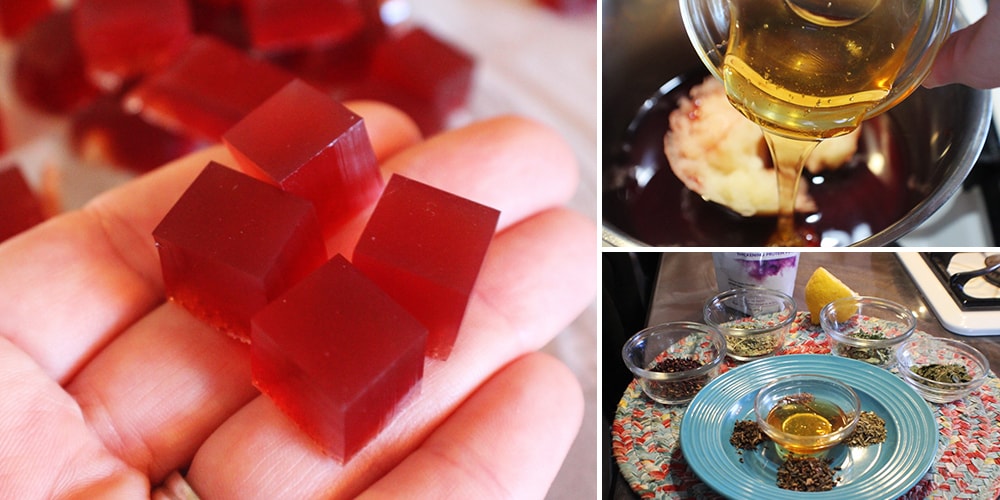
Just Like Melatonin
You may think the biggest drawback of not getting enough sleep is feeling exhausted and sluggish all day. But… that’s really just a symptom. And it’s not even the worst one!
What Sleep Deprivation Does to Your Body
The exhaustion we feel when we don’t get enough sleep is an indication of the chaos churning in our inner world. The real issue with sleep deprivation is that it not only makes you feel sluggish and incapable of carrying out everyday tasks, but it also throws your system out of whack and robs your body of necessary healing time.
It’s no wonder. Many of us lead hectic lives, and a third of US adults don’t get nearly enough sleep, according to the CDC. This isn’t good for us. As we sleep, our bodies enter “repair mode.” This happens more specifically once we hit the phase of sleep called rapid eye movement or REM sleep, which is critical for brain and immune system functions and a lot more. Therefore, it should come as no surprise that sleep deprivation is linked to a range of chronic medical conditions such as diabetes, heart disease, obesity, and depression—all persistent health issues.
Natural Sleep Aids
Many turn to melatonin, an over-the-counter medication, to help them sleep. Melatonin is a chemical naturally produced by the body during our wake cycle. When we have good dietary and lifestyle habits, our bodies make ample amounts of this chemical during the day and release it at night when it’s time to rest. However, for many of us, it is difficult for our bodies to make enough melatonin for various reasons—for instance, our overuse of bluescreens, our excessive late nights, and our unhealthy eating habits. So, opting for an over-the-counter sleeping aid like melatonin might seem like a safer option than, say, prescription sleeping medications. And it probably is.
But, taking synthetic melatonin can have its own set of problems, too, such as causing your body to slow or stop producing its own melatonin. Plus, a lot of the time, people who take this supplement feel extremely drowsy and sometimes even have a pounding headache when they wake up the next day.
So then, what’s the best way to support sleep naturally without causing yourself more problems? An herbal sleep aid, of course!
I’ve made these sleep aid gummies with some of the best-known herbs for improving sleep, like valerian root, passionflower, and lemon balm. I opted for herbs that promote sleep in different ways and included some that contain naturally high melatonin levels, too. To balance out the bitterness of the vital sleep herbs Valerian and Saint John’s Wort, several of these ingredients have a slightly acidic flavor. Then, I used healthier natural beef gelatin to set them and raw honey to sweeten them, so there’s no major sugar rush right before bed. Let’s examine the herbs that were utilized more closely.
Herbal Sleep Inducers
The herbs used to make these sleep gummies are listed below, along with a little rundown on why I chose them:
Valerian – is a mild sedative herb often used to treat insomnia, anxiety, and restlessness. It works by increasing GABA in the brain. It can reduce the time it takes to fall asleep, help you stay asleep, and help you wake up less tired in the morning.
St John’s Wort – St. John’s Wort contains natural melatonin and can help promote REM sleep. It can also help reduce racing thoughts at bedtime by soliciting the brain to produce feel-good chemicals like serotonin.
Hibiscus – Contains natural levels of melatonin and anxiolytic chemicals, which naturally reduce anxiety and promote sleep. Also, the calming effects improve with continued use.
Passionflower – is also a natural sedative that can help with nighttime anxiety, increases GABA, and has been shown to help alleviate insomnia.
This Sleep Blend Tincture is designed to help you fall asleep faster and stay asleep longer. It increases the production of GABA and helps to improve sleep difficulties associated with age.
Lemon Balm – Lemon balm, in conjunction with the other herbs in this blend, helps improve stress and mood while soothing the central nervous system and helping to improve the quality of sleep.
Mulberry Leaf – though not a commonly touted medicinal plant, mulberry leaves are incredibly high in melatonin and the amino acid tryptophan. They’re not only neuroprotective but also high in reparative antioxidants that’ll keep benefiting your body after you fall asleep.
California Poppy – The California poppy is a poppy with gentle sedative properties. It’s not a heavy hitter like its cousin, the Opium Poppy, which is used to make strong pain medicines like morphine. This poppy contains zero opium. But it does contain many of the same calming properties without the dangerous and mind-altering chemicals. You can get your own California Poppy seeds here.
Holy Basil – Because of its adaptogenic characteristics, holy basil helps the body maintain a healthy equilibrium when exposed to emotional and physical stressors. Additionally, it can help balance hormones that regulate our sleep, like melatonin, and prepare the body for the repair process carried out while we sleep.
⇒ Medicinal Plant Map for Every State (Video)
Herbal Sleep Gummies
These sleep gummies don’t contain any processed sugar, dairy, or gluten. The herbs used should be dried and crushed.
Ingredients:
 3 tbsp. bone gelatin powder (I used beef gelatin, but you can also use agar agar)
3 tbsp. bone gelatin powder (I used beef gelatin, but you can also use agar agar)- ½ of a lemon (whole if small)
- 2 tbsp. Lemon Balm leaves
- 1 tbsp. Mulberry leaves
- 1 tbsp. Hibiscus flower
- 1 tbsp. Passionflower leaves
- 1 tsp. Holy Basil leaves
- 1 tsp. California Poppy (leaves, stems, flowers mix)
- ½ tsp. Valerian root
- ½ tsp. St. John’s Wort (flowers, buds, upper leaves mix)
- ¾ cup water
- 3 tbsp. raw honey
You will also need:
- A tea cloth or nut milking bag
- A small sauce pan
- A rectangle or square baking dish or candy molds
- A container for storage
Steps:
Step 1. First, you’ll need to make an herbal “tea.” Squeeze the lemon juice into the measuring cup. Next, add water to the cup until it reaches the one-cup mark.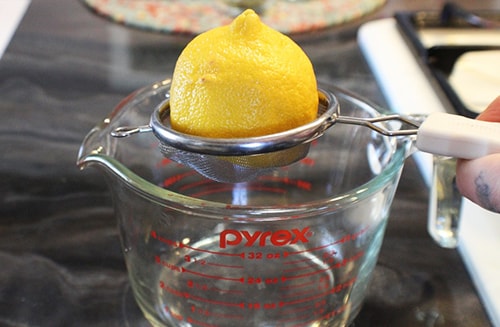
Step 2. Add the herbs to your tea cloth or bag and place them in your saucepan along with the water and lemon juice. 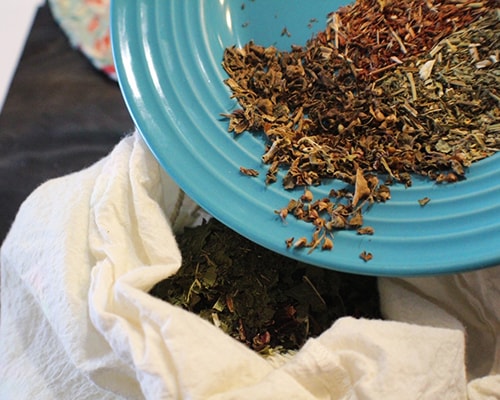
Heat just until small bubbles begin to form, then shut it off and leave it to macerate for at least ten minutes. Meanwhile, prepare the gelatin.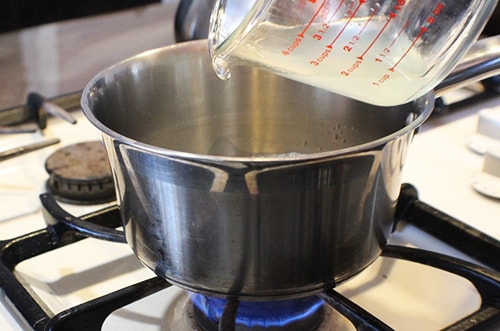
Step 3. To make gelatin, you must bloom it by mixing it with enough warm water to form a gelatinous mush. I try to remove as many lumps as I can, but I almost always inadvertently leave some behind. It’s okay to end up with a few little “jelly lumps.” It’s not the end of the world.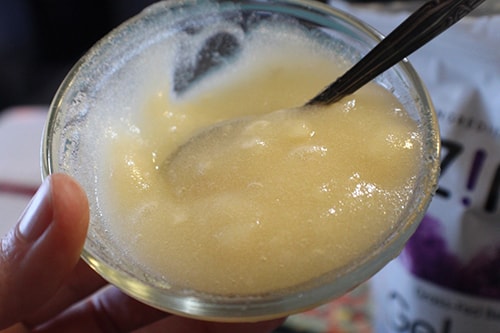
Step 4. Add the tea liquid back to the pan along with the honey and the lump of gelatin.
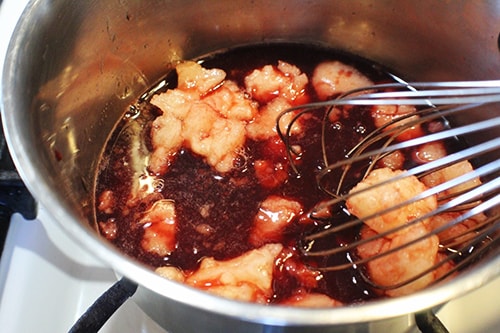
Once the gelatin has completely dissolved, reduce the heat to low and stir. After that, give it a minute to heat up, then turn it off and pour it into your backing dish or molds. Allow it to cool in the refrigerator for three hours.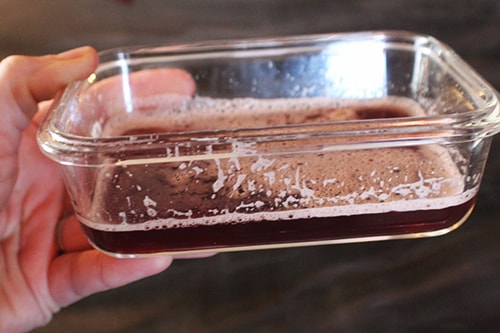
Step 5. When your gummies are finished, you can either remove them from the mold or cut them into squares to store them in a lidded container. I store mine in the refrigerator, but you don’t have to keep them there.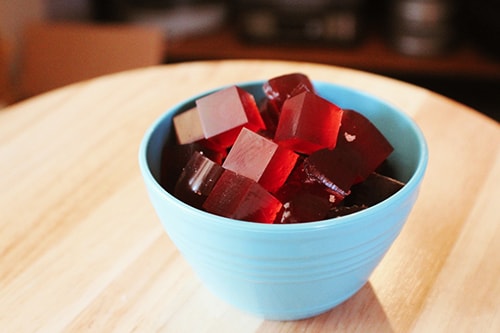
How to Take
Take the gummies once you’ve settled in for the night and started resting comfortably. One gummy should suffice, but if that’s not enough the first time, you can try two the next night and see how your body responds. Enjoy!

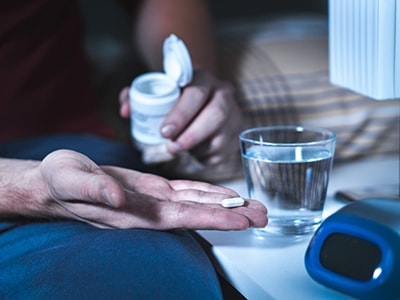
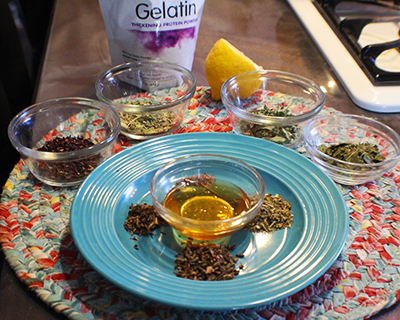 3 tbsp. bone gelatin powder (I used beef gelatin, but you can also use agar agar)
3 tbsp. bone gelatin powder (I used beef gelatin, but you can also use agar agar)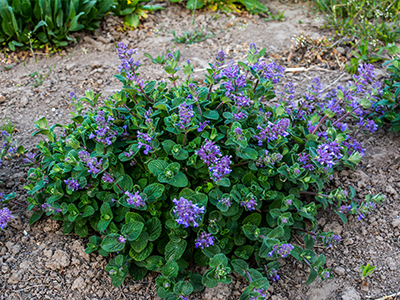
I bought your book and so impressed with it and I also love your handy little recipes you send in e-mail. I’ve tried the Rosemary tincture and it works and I’m hoping to get off the RA meds that I know are not good for me (Hulio Injection) but without it I cannot walk or use my hands and any help you can give me in that direction is most appreciated. Again…my heartfelt thanks
Hi, I started taking New Zealand Green Lipped Mussel Oil pills by an advice from a friend who takes them for RA. Before, I couldn´t functionally use my hand, and it was in constant pain 24/7. After a few months, the pain was completely gone and I slowly started to use my hand again. It´s been a year and a half, and I still take them and my hand is very close to back to normal, without pain at all. I recomended it to friends and they also report healing. Hope it helps and you can get your life back.
I just read you article “Just Like Melatonin” and looking forward to making some of this. The article doesn’t mention how many gummies this makes and/or how many to cut it up into, to get the expected amount per gummy. Can you clarify that? Thanks
Is this suitable for children?? What ages? I have an 8 yo who has trouble with quieting her thoughts at bedtime.
I am surprised at the number of people (in my family) that give their little kids melatonin. I always tell them to just rub lavender oil on the backs of their necks or put it in a diffuser by their beds. Talk to the wall.
A note on lavender oil:
Lavender oil is has been identified as an endocrine disrupter. My 2 yo child saw an endocrinologist for precocious puberty. I was asked if I had been using lavender oils to help our little one sleep or lavender soaps or shampoos.. I was told it can play a factor in early onset puberty.
I think it’s notable and something we need to all know about in the process of making our informed decisions.
I’m glad it works for many and am highlighting something I learned in case others benefit from this shared knowledge.
Great information. Where can I buy all the different herbs needed? Thank you
Where do we buy all these herbs?
I am concerned with some of the herbs conflicting with prescription medication. Such as Lexapro and St. John’s Wart or any other conflicts with Sinemet. Are you aware or have suggestions for this?
Is this suitable for children? Any idea of what size of gummy to give as per the Child’s weight/grams of gummy?